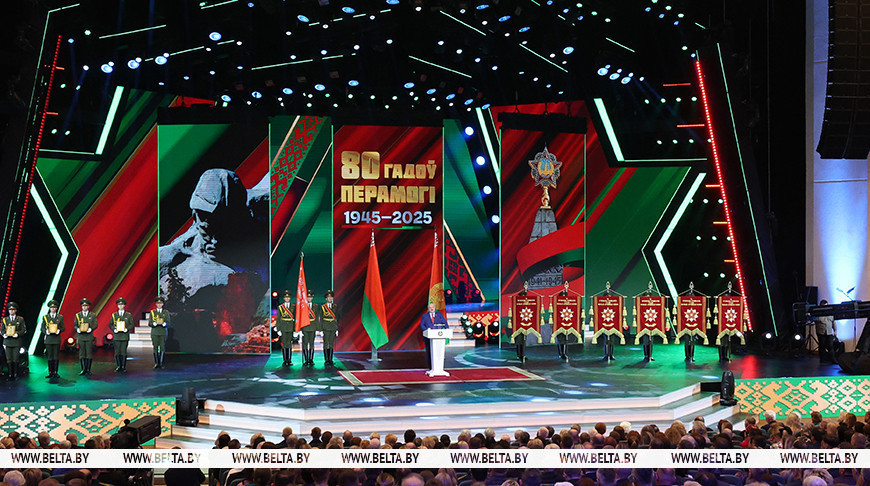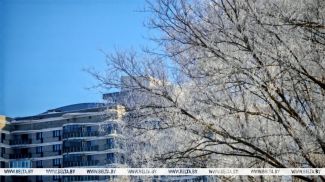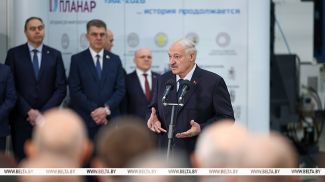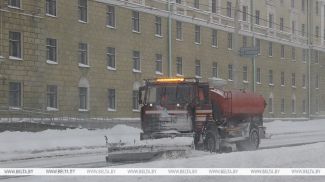
MINSK, 6 May (BelTA) – During a solemn assembly held on 6 May to mark the 80th anniversary of the Soviet nation’s Victory in the Great Patriotic War Belarus President Aleksandr Lukashenko stressed the importance of celebrating this date, BelTA has learned.
The head of state remarked that at the beginning of his speech he would like to share pertinent thoughts concerning the celebration of Victory Day. As they say, the topic of the day. The president briefly talked about the matter when he visited the Russian city of Volgograd not so long ago.


“As they say, judge for yourselves. It has been 80 years since that great day when our Soviet troops broke the back of the most dangerous and terrifying enemy of the past century. 80 years. What about us? We create memorials and complexes: Khatyn, Ola, Krasny Bereg, Brest Fortress, Buinichi Field. We modernize them again and again, pouring colossal resources into the projects. We erect monuments. We build and rebuild monuments. We put them in order and take care of them. The Mound of Glory, Pobedy Square, the monument to the hero city of Minsk. Bit by bit we collect facts of the victories and horrors of that war. We go to these monuments and memorials, leading the children by the hand with us. We teach at schools and higher education institutions. We delve deep into this war in search for the nerve that made the victory possible,” Aleksandr Lukashenko remarked.
He added that thousands of topical events are held in the country, movies are made, and articles get written. Scientists also dive deep into the past.


“And everyone has an attitude to those years and to this war. Our society is not exactly divided… Although one can say it is divided into certain groups. Large groups. For some the things I’ve said are natural. Because they did not only see the horrors of that war. Some of them fought with weapons in their hands. This is why I am convinced that for them the war and the Victory we talk about today and we will talk about tomorrow represent a natural course of events from the point of view of the fact that they created this very Victory,” the head of state said.
Another part of the society is children of those, who fought in the war. Aleksandr Lukashenko remarked that he believes himself to be part of this category. “We’ve listened to and heard horrors of that war. It is unacceptable for us. It is simply inexcusable for us. It is in our blood. Naturally, our kids have not seen this war. They haven’t heard the stories from those, who experienced this disaster, this war. They see it as they look at our monuments and museums. They comprehend as much as we present it to them,” the president stressed. “And all these categories, groups of people have different perceptions of this war and of our Victory. Just like everyone has his or her own perception of any event in their lives.”

“To be honest, there is another group of people. Should I talk about them today? It is made up of our self-exiled opposition and those, who have inherited the gene of fascism. Those, who fled across the ocean and beyond. They offer advice to us from over there. One always wonders (let’s not delude ourselves on this holy day) whether we should [celebrate Victory Day]. 80 years. Maybe we shouldn’t do it? Why do we need all of it? Some people offer a beautiful piece of advice from over there to us: let them rest in peace. Nearly 30 million Soviet people and other people from Europe. 30 million dead Chinese, who fought against Japanese militarism. 30 million. Actually some say that from 70 to 100 million people died during World War Two. 80 years. I repeat once again: maybe that’s enough? Maybe we shouldn’t do it? Why do we need all of it: events, solemn and regular assemblies, parades that sometimes come with risks? It is particularly topical for Moscow today. Maybe we should let them rest in peace indeed,” the head of state wondered.
“Moreover, let’s be honest, some of us do it pro forma. To my great shame and regret. My subordinates. Direct subordinates. Possibly indirectly through someone else. Civil servants, who organize these events according to assignments. It is inadmissible particularly if it concerns children and young people. Their actions are not driven by their souls and hearts. There are people like that among our kind. This is why the question is even more important and topical: maybe that’s enough? No, my dears, it is not enough! It is not enough because we do it to prevent it from happening again. I’ve already said it in [the WW2 memorial] Khatyn: if we forget the road to monuments, forget the road to Khatyn, it will come to us. We don’t want that. I talked about it in the holy Stalingrad land. We don’t want that! This is why we’ve been doing, we do, and we will continue doing it. It is an answer to those, who try to get us to turn away from this Great Victory by pretty or by stupid means, by direct methods. What if it happens again? If it happens again, we need to understand that before us there were people, who did not spare their lives, all they had holy in order to protect this land, to protect their country. They protected their relatives, friends, children, and loved ones. And they set examples of this protection for us,” the Belarusian leader stated.

Aleksandr Lukashenko reminded that for the sake of victory Soviet citizens would deliberately accept death, closed firing slits with their bodies, fight and sacrifice their lives. “They forged ahead without fear. These are examples for us. Those, who are abroad, are terribly afraid of it today,” the president remarked.
The head of state also made a statement from a purely human point of view, including in the religious context: “Millions of people, who are no longer with us, are in heaven. Believers and non-believers will have to agree with me that we will also be there with the passage of time. Such is life. How will we feel if we meet with them? If we don’t appreciate their heroic deeds, if we don’t honor their memory, if we don’t thank them every day for the heroic feats they have accomplished primarily for the sake of us, for the sake of our lives? How will we look at them? Just a human point of view.”
“This is why judge for yourselves. Our life will be judged, including by our children, by how we appreciate and treasure the memory of our parents. This is why if we want a new generation, our children and grandchildren to treat us with respect, then we should honor this memory. The memory and these people, who gave their lives for our sake,” the Belarusian leader concluded.

















